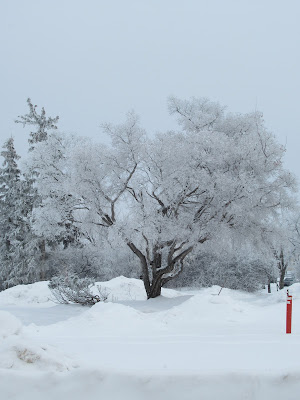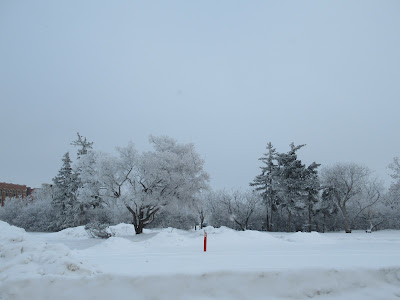I had a meltdown on the way back from coffee on the morning of Christmas Eve.
We have coffee and breakfast at French Press every Saturday morning, and I had just given them a Christmas card describing how welcome we--and nine other Saturday morning regulars, with whom we now chat--feel there. For Christmas, they changed their little vases with live flowers for candles, and George often uses quiet moments to put a new tea light on a table and light it. They greet us by name; George fills my coffee cup with hot water when he sees me come in the door to heat my mug. So I'd tried to describe their gifts tor cheer and friendliness--backed up by wonderful baking--that they give us Saturday after Saturday. We all need someone to hold up a mirror to our best selves occasionally, and Christmas seemed a good time to do this for George and Nicole. Still, I was a bit surprised by their heartfelt response.
But the meltdown. We were on our way home and Bill had turned on his radio to find Handel's Messiah in the middle of Part Two where Handel gets political. The bass has a lovely solo describing what the "kings of the earth" get up to: "Why do the nations so furiously rage together / And why do the people imagine a vain thing?" What vain thing do we imagine? Conquest? Power? More and bigger and better? The tenor chimes in to suggesting that God or Christ "break them with a rod of iron; / thou shalt dash them in pieces / like a potter's vessel." Almost without a break, the choir sings the "Hallelujah Chorus." Were I in a concert hall, I would have stood, as King George II did in 1741. We don't know why: was he moved by the music, was he stiff from sitting so long, or was his gout troubling him? Perhaps the point is this: we don't accord any other piece of classical music this honour, and we've intuitively kept up the practice for 281 years. It just feels right.
But I simply cried and sobbed. I couldn't stop. Words take time to choose and say or write, but my initial reaction was almost wordless. It took no time at all. We had choices. Breaking or making was the first choice that I felt at all my nerve ends. We could rage furiously or we could make something beautiful, as Handel did. I felt this with startling force. And then the words came, because, really, I needed to explain this reaction to Bill. I was reacting to most of 2022, to the rage we saw behind Putin's war, his raging need to punish Ukrainians for not submitting to his will and his army. We saw it in some members of the truckers' convoy. We certainly have seen it in American politics, where rage and factionalism are bringing Congress to a halt. We've seen it in the Iranian government's response to women's demand for more freedom. What is this world-wide rage all about? I couldn't answer that, and this made me cry harder. (There's another kind of rage: the "Me too" rage, the "Black Lives Matter" rage, the Iranian protestors' rage, but that's for another day.)
We could make war or we could make beauty or knit socks or sand down an old table or write a note to an aunt who isn't well. We could take a photograph of hoarfrost or a sunrise and put it on Facebook. Have you noticed how many people react to posts that are beautiful? We can choose to create or destroy. When we get up in the morning, we can choose rage or choose kindness and patience. We can be curious rather than judgmental.
It's hard being human. It's been very hard the last three years. Not surprisingly, the new year has brought out all the researchers and columnists writing about our our mental and physical wellness, and it turns out it's pretty simple. Foster relationships. Tend them and value them. Having good relationships is the easiest way to be happy; it's also the most direct route to a long life. Exercise is the second most direct route to a long and happy life. So work your muscles and your heart--both your hearts--the one in your chest and the one between your ears.
I know that the mornings are still dark here. My weather ap tells me that we're gaining a minute of sunlight every afternoon but that sunrise has barely budged. But once you're had your first coffee, you can choose to celebrate the human with your own "hallelujah" a la Handel or Cohen. Practice guerilla kindness. Open a door. Buy someone a coffee. Listen to someone's struggles. Kindness is not only good for us, though our neurotransmitters certainly give us a lovely glow afterwards. It's also a chance to change the world of the recipient, who regards a kind act more highly than we'd guess. It changes their sense of the world for a moment. They take away a sense of warmth--of your warmth. And they trust the world a little bit more. Trust is in very short supply these days, and is probably one of the reasons there is so much rage. When we don't trust the world, we're more likely to sort people into "us" and "them." That at least lets us know who we are and what we believe.
Instead, you could embrace human uncertainty and knit another row, make another quilt block, sow some seeds (or just read the seed catalogue for now), send a grateful email. And hear the soft "hallelujah!" behind you.



A beautiful post. Thank you for it.
ReplyDeleteTheresa Kishkan
Yes to everything you say. Yes.
ReplyDeleteI'm so tired of all the rage and anger in the world, even my own. We could make this world a better place and we don't.
ReplyDelete"We all need someone to hold up a mirror to our best selves occasionally"
ReplyDeleteYes, thank you for the reminder to do this for others more often. -Kate